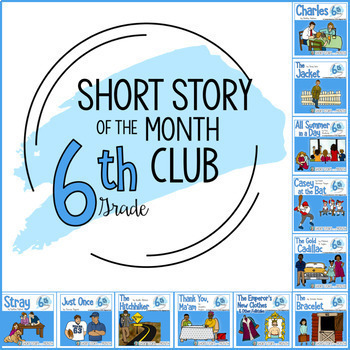Short Story Units for Middle School (Short Story of the Month Club, 6th Grade)
- Zip
What educators are saying
Products in this Bundle (16)
showing 1-5 of 16 products
Description
Short Story of the Month Club, 6th Grade
Grab this collection of popular Short Story Units tailored for 6th grade reading! I created these units specifically around the CCSS for grade 6, but they can absolutely be used in grades 5-8 - please check the preview file to verify this.
Try the first month free! Click here.
The Short Story of the Month Club, Grade 6, is a bundle of short story units created specifically to cover the Common Core standards for grade 6 using short stories that I promise your students will LOVE. They'll also love these activities, as they aren't your average short story activities. Again, I encourage you to download the free unit for Stray mentioned above to see just how these units are tailored.
DOWNLOAD FULL-BUNDLE ALIGNMENTS HERE!Includes breakdowns by skill, by Common Core standard, and TEKS will be available soon!
I created this short story unit bundle because I was sick and tired of wasting my money on cookie-cutter short story units that are generic and BORING.
Every unit is just as jam-packed and rigorous as the Stray Unit for August, including essential questions that tie together paired texts (included) across genres and types, close reading with annotation guides, mini-lessons for relevant concepts and skills, comprehension quizzes and tests, vocabulary guides, discussion questions, questions that require text evidence, and tons more.
These eleven units comfortably cover ALL Reading Literature Common Core Standards for Grade 6, address ALL Reading Informational Text Standards for 6th Grade, plus additional standards in Writing, Language, and Speaking and Listening. A TEKS alignment is included.
You can teach these stories in any order, but I recommend sticking closely to my order, as some skills do grow on one another and the rigor absolutely increases as the months go by.
Grade 6 Short Story Units Included:
FREE! August Selection – Stray by Cynthia Rylant
1. September Selection – Included – Just Once by Dygard** Focus: Elements of Plot (Plot Pyramid), Responding to Questions for RL.6.5, Realistic Fiction Genre Characteristics, Main Idea & Supporting Details (Informational Text standards, paired text links included)
2. October Selection – Available NOW! – The Hitchhiker by Fletcher** Focus: Elements of Drama, Story Devices (foreshadowing, flashback, suspense), Comparing Written, Audio, and Video Versions, Elements of Plot, Analyzing Development of Plot, Finding Text Evidence, Nonfiction Paired Text, Essential Question
3. November Selection – Thank You Ma'am by Langston Hughes Focus: Characterization (Direct and Indirect), Character Traits, Theme, Comparing Similar Themes Among Genres, Finding Text Evidence, Paired Passages - poem by Hughes, memoir by Hughes, and excerpt from biography about Hughes, all with similar themes - Deep Analysis included!
4. December Selection - The Emperor's New Clothes (Folktale unit with other folktales included) Focus: Text Evidence (EXTRA practice on this skill in several different activities), Folktales - Properties of Different Types, including fairytales, tall tales, fables, legends, and myths - at least one of each type of folktale is included within this unit with accompanying activities!; Conflict (Internal vs. External), Figurative Language
**Review of these skills from previous units: theme, character traits, characterization, story elements, plot pyramid**
--Mid-Year Assessment! --
5. January Selection – The Bracelet by Yoshiko Uchida
Focus: Heavy on the informational text in this one! Point of View, Fiction Genres, Characteristics of Historical Fiction, Constructed Response with Vocabulary in Context, ACE Method for Constructed Response Questions, Citing Text Evidence
6. February Selection – The Gold Cadillac by Mildred D. Taylor
Focus: Text Evidence, Character's Point of View, Mood and Tone, Static/Dynamic Characters, ACE Questions, Plot and Theme
7. March Selection – "Casey at the Bat" Narrative Poem
Focus: Text Evidence, Theme Development, Summarizing Stanzas, How does each stanza fit into the narrative poem?; Sound Devices in Poetry (and the effects of), Figurative Language in Poetry
8. April Selection - All Summer in a Day
Focus: Deep Characterization Analysis, Impact of Setting on Mood, Figurative Language Analysis, Text Evidence Activity + Practice Test, Imagery/Sensory Details
9. May Selection – The Jacket by Gary Soto
Focus: Text Evidence, Memoirs, Writing a Memoir, Personification, Deep Figurative Language Analysis, Poetry (Odes), Includes Activities and Comparison for "Ode to Pablo's Tennis Shoes" by Gary Soto
10. June Selection – Charles by Shirley Jackson
Focus: DEEP Theme Analysis, Development of Theme Analysis, Comparing Themes Among Texts/Genres, Text Evidence, Making Inferences, Indirect Characterization Analysis, Analyze Meaning of Phrases
----Final Exam for Grade 6 Reading Literature----
*EDITABLE* I have added my own original files in PowerPoint format for you to edit if you wish for your own classroom use. This only includes story-specific printables and I can't guarantee your ability to edit them based on your computer's settings and your tech knowledge. Bonus activities that have been included here as a courtesy to you (like interactive notebook lessons) will not include the editable versions - those editable versions are only available in the original resources.
FAQ
Q: Are the short stories included with this download?
A: No, but I am taking care to choose stories that I can easily direct you to in case the story is not in your anthology.
Q: I purchased more than one grade level club membership. Will you use any of the same stories in multiple grades?
A: No, definitely not. I will never use the same story in more than one collection.
Q: What about other grades?
A: The 7th and 8th grade clubs can be found here:


